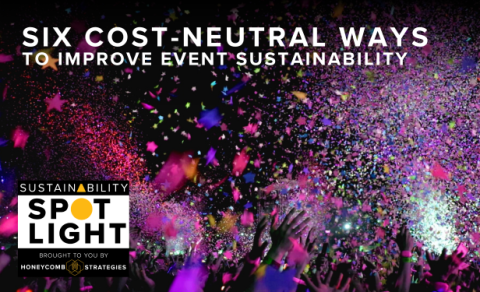Six Cost-Neutral Ways to Improve Event Sustainability

Exclusively sponsored by Honeycomb Strategies
Organizing a sustainable event doesn’t have to come with a hefty price tag. Here are six practical, no-cost strategies to enhance sustainability at your next event.
1. Eliminate Floor Coverings
Floor coverings like carpet and vinyl flooring, often used to enhance aesthetics or protect permanent flooring, can be significant contributors to waste. Even reusable carpet is often only installed three times before it is disposed of. Eliminating some or all temporary flooring is a simple step toward reducing the event’s environmental footprint. Prime candidate areas for removal are those with high foot or vehicle traffic, like aisles in an expo hall, displays for cars or heavy equipment, or food and beverage areas. By skipping the floor coverings, you not only reduce waste but also save on the cost and labor of installation and removal. Plus, it gives the event a cleaner, more natural look, aligning with eco-friendly values.
2. Encourage Attendees to Bring Reusable Water Bottles and Coffee Cups
Another effective strategy for improving sustainability while lowering your cost liability is to ask attendees to bring their own water bottles and coffee cups. This reduces the need for disposable cups, cutting down on waste and the costs of providing these items. Not only does this promote an eco-friendly mindset among attendees, but it also demonstrates the event’s commitment to sustainability, fostering a sense of community responsibility.
3. Swap Foam for Cardboard in Signage
Event signage is essential but often ends up as waste, especially when made from non-recyclable foamcore. Switching to cardboard for your signage is an excellent way to maintain visibility while being eco-conscious. Cardboard is not only highly recyclable but also biodegradable, providing options for disposal to reduce the environmental impact. It can be printed on just as easily and offers a professional look that aligns with sustainable practices. This simple switch helps in promoting a greener event without any additional cost.
4. Reuse Materials from Last Year
Reusing materials from previous events is a smart, sustainable practice. Items like banners, lanyards, tablecloths, and even décor can often be stored and reused. This not only saves resources but also cuts down on the budget for new purchases. Encourage your team to carefully store and catalogue items that can be reused. Additionally, consider designing timeless and versatile materials that don’t become outdated quickly, ensuring they can be used across multiple events.
5. Recruit Volunteer Waste Sorters
Waste management is a crucial aspect of event sustainability. Recruiting volunteers to act as waste sorters or monitors can greatly enhance your event’s recycling efforts. In exchange for their service, offer volunteers free access to the event. This initiative not only ensures proper waste segregation but also fosters a community spirit and raises awareness about sustainability practices. Volunteers can guide attendees on how to dispose of their waste correctly, significantly improving the event’s recycling rates.
6. Implement a Nighttime Power Down Policy
A nighttime power down policy can significantly reduce energy consumption. While it’s important to reduce non-essential systems at the venue including lighting and heating,
this can also be introduced as a policy for exhibitors, AV vendors, and event hosts who have any electronics or lighting in their displays, conference rooms, and exhibition spaces that can be turned off or set to energy-saving modes after hours. This practice not only lowers the event’s carbon footprint but also results in considerable cost savings on energy bills, benefiting both the environment and the event budget.
Finding the Green
Sustainable event planning doesn’t have to require a large budget. And when a sustainable initiative does cost more than you anticipated, that’s a great time to leverage your sponsors. Finding partners whose values align with yours and who want to support your environmental solutions is a win-win for both event planners and brands with sustainability values (or earmarked ESG funds). And for cost-neutral wins, creative solutions like those we’ve proposed here only contribute to a greener planet and enhance your event’s image, showing attendees and stakeholders that sustainability is a priority.
Honeycomb Strategies specializes in impactful solutions for sustainable events, sports, and venues. hcsustainability.com / [email protected]


Add new comment